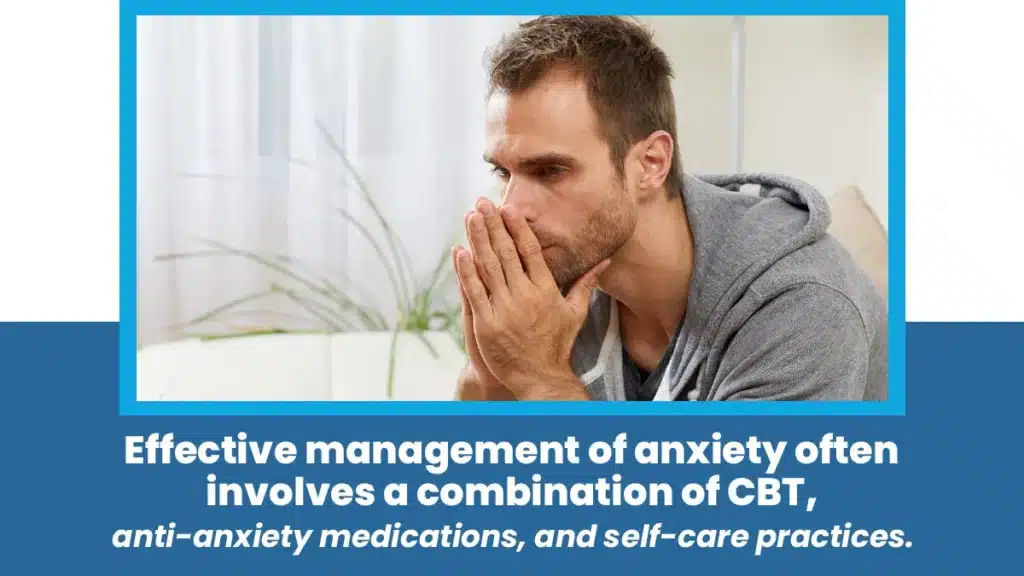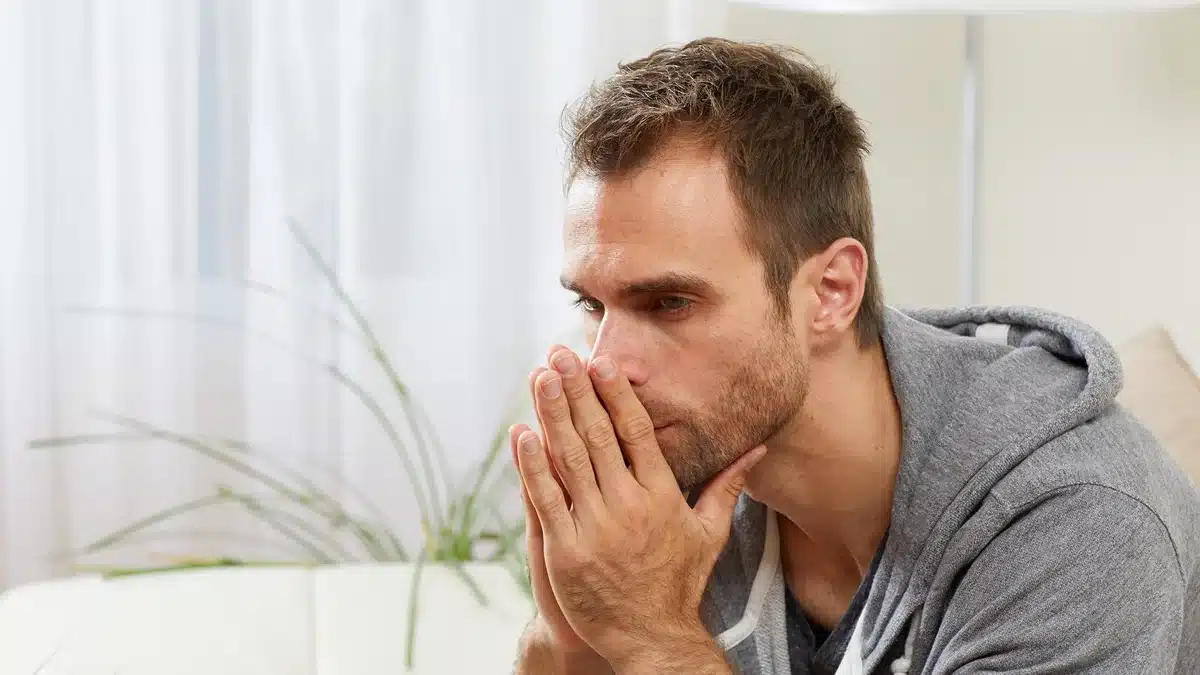Persistent worry, fear, and tension can escalate into anxiety disorders, affecting one’s physical and mental health. The good news is that several mental health care options exist to help restore well-being.
Whether you or someone you know is struggling with anxiety disorder, this article aims to provide valuable insights to help navigate the journey toward improved mental well-being. Keep reading as we delve into the details of anxiety, examining its general types, underlying causes, and most effective treatments.
Key Takeaways
Anxiety disorders are common but treatable medical illnesses that can significantly impact daily life. Here is what this article touches upon:
- Physical, psychological, and behavioral symptoms like muscle tension, excessive worry, and avoidance characterize anxiety disorders.
- Genetic factors, environmental triggers, stress, and chronic health conditions contribute to anxiety disorders.
- Accurate diagnosis involves thorough medical and psychological evaluations, utilizing standardized criteria like the DSM-5.
- Effective management often involves a combination of CBT, anti-anxiety medications, and self-care practices.
- Family, peer, and online support play a crucial role in navigating and alleviating the challenges of anxiety disorders.
Contact The Haven Detox-Little Rock at (501) 271-3342 for professional mental health care in a supportive residential rehab setting.
Understanding Anxiety Disorder
Anxiety disorder is a common mental health condition characterized by excessive worry, fear, or uneasiness that can interfere with daily life. It goes beyond the typical anxieties experienced by people and becomes persistent, overwhelming, and often irrational.
According to the National Alliance on Mental Illness (NAMI), anxiety disorders are the most common mental health issue in the United States, with over 40 million adults (19.1 percent) affected. Around 7 percent of children between the ages of 3 and 17 also experience anxiety issues each year. Symptoms of anxiety often start appearing before the age of 21.
Here are the most common types of anxiety disorders:
- Generalized anxiety disorder (GAD)
- Panic disorder (Panic attacks)
- Social anxiety disorder (Social phobia)
- Specific phobias, such as heights, animals, or flying.
- Obsessive-compulsive disorder (OCD)
- Post-traumatic stress disorder (PTSD)
- Selective mutism
Each type has distinct features, but all share a common thread of excessive and irrational worry that can interfere with work, school, or relationships.
Anxiety Unveiled: Key Symptoms You Shouldn’t Ignore
Recognizing the symptoms of anxiety disorder is crucial for timely intervention and support. The manifestations of anxiety disorder can be categorized into three main areas:
Physical Symptoms
Individuals with anxiety often experience these physical symptoms, which can be overwhelming and interfere with daily activities.
- Restlessness
- Muscle tension
- Fatigue
- Sweating
- Increased heart rate
- Changes in blood pressure
- Trembling or shaking
Psychological Symptoms
The psychological symptoms of anxiety can impact cognitive functions, making it challenging to focus and maintain emotional well-being.
- Excessive worry
- Irritability
- Difficulty concentrating
- Racing thoughts
- Feeling on edge
- Fear of the worst happening
Behavioral Symptoms
Behavioral symptoms can lead to changes in daily routines and social interactions, affecting overall quality of life.
- Avoidance of triggers
- Compulsive behaviors
- Agitation
- Sleep disturbances
- Seeking reassurance
- Difficulty in decision-making
If you or someone you know is experiencing these symptoms, reaching out to a mental health specialist is a crucial first step toward regaining control and finding relief.
Breaking it Down: Factors Behind Anxiety Disorders
Anxiety disorders are complex conditions that can stem from an interplay of a variety of factors. Here are some common causes and contributing factors to anxiety disorders:
Genetic Factors
Genes, the building blocks of our bodies, play a crucial role in the onset of anxiety disorders. Research studies indicate that if a person has a close family member with an anxiety disorder, they may be more susceptible to developing one themselves. Specific genes associated with neurotransmitter regulation and brain chemistry may influence an individual’s vulnerability to anxiety.
Environmental Triggers
The environment we grow up in can significantly impact our mental well-being. Exposure to traumatic experiences, such as accidents, abuse, or loss, can trigger anxiety disorders. Additionally, a chaotic or overly protective environment during childhood may contribute to the development of anxiety. External factors like financial instability or societal pressures can also play a role, creating an atmosphere that fosters anxiety.
High-Level Stress
Stress is an unavoidable part of life, but prolonged exposure to high-level stress can preclude the onset of anxiety disorders. Demanding work situations, relationship challenges, or academic pressures can push individuals to their breaking points, causing persistent worry and fear that characterize anxiety disorders.
Chronic Health Conditions
The relationship between physical health and mental well-being is undeniable. Chronic health conditions, such as heart disease or diabetes, can contribute to anxiety disorders. The ongoing management of these conditions, coupled with the uncertainty they bring, can amplify stress levels and pave the way for the development of anxiety disorders.
Acknowledging these factors is a crucial step toward a more comprehensive understanding of anxiety, enabling individuals to seek appropriate support and interventions.
Identifying the Struggle: Diagnosing Anxiety Disorder
Identifying and diagnosing anxiety disorders is a crucial step toward effective intervention and support. Mental health professionals employ a combination of methods to assess individuals experiencing symptoms of chronic anxiety.
Medical History Examination
A crucial step in diagnosing anxiety disorder is a thorough examination of the individual’s medical history. Healthcare professionals inquire about the patient’s past and present physical health, any medications they are taking, and any family history of mental health conditions. This information helps identify potential contributing factors and rule out other medical conditions that may mimic anxiety symptoms.
Psychological Evaluation
A comprehensive psychological evaluation is conducted to assess the individual’s emotional and mental well-being. This evaluation may involve discussions about the individual’s thoughts, feelings, behaviors, and coping mechanisms. Observing how a person responds to various situations and stressors provides valuable insights into their mental health and aids in determining the presence and severity of anxiety.
Using the Diagnostic and Statistical Manual of Mental Disorders (DSM-5)
Health professionals often refer to the DSM-5, a widely accepted classification system, to aid in the diagnosis of mental illnesses, including anxiety disorders. The DSM-5 outlines specific criteria and symptoms associated with each type of anxiety disorder, ensuring a standardized and consistent approach to diagnosis. Clinicians use this manual as a guide to match observed symptoms with established criteria, facilitating a more objective and reliable assessment.
This comprehensive approach ensures a thorough understanding of the individual’s unique circumstances, laying the foundation for targeted and effective interventions.
Road to Recovery: Exploring Anxiety Disorder Treatments

When it comes to tackling anxiety disorders, a variety of treatment options are available, each tailored to address the unique needs of individuals grappling with this mental health challenge. Let’s explore them in detail:
Cognitive Behavioral Therapy (CBT)
Cognitive behavioral therapy (CBT) stands as a cornerstone in anxiety disorder treatment. This evidence-based approach focuses on identifying and reshaping harmful thought patterns and behaviors. By fostering healthier cognitive habits, CBT equips individuals with practical tools to manage severe anxiety effectively, promoting lasting change and improved mental well-being.
Medication-Assisted Treatment (MAT)
Medication-assisted treatment (MAT) for anxiety involves combining counseling or therapy with prescription medications to manage symptoms effectively. Common medications include selective serotonin reuptake inhibitors (SSRIs) or benzodiazepines. MAT aims to alleviate anxious feelings and improve overall well-being, offering a comprehensive approach to mental health support.
Self-Care Practices
Incorporating self-care practices into daily life plays a pivotal role in anxiety management.
Importance of Regular Exercise: Physical activity releases endorphins, the body’s natural mood enhancers, reducing stress and anxiety. Regularly exercising not only benefits physical health but also serves as a powerful tool in maintaining mental well-being.
Balanced Diet and Its Role: A well-balanced diet rich in nutrients supports overall health, including mental health. Certain foods, like those high in omega-3 fatty acids and antioxidants, can positively impact mood and anxiety levels.
The Impact of Enough Sleep: Adequate sleep is crucial for mental and emotional resilience. Sleep deprivation can exacerbate anxiety symptoms, highlighting the importance of prioritizing a consistent and quality sleep routine.
Psychotherapy Treatment
Psychotherapy, or talk therapy, offers valuable insights and coping mechanisms for individuals grappling with anxiety disorders.
Usage of Psychotherapy Treatment: Psychotherapy involves discussions with mental health providers, such as a trained therapist, to explore thoughts, feelings, and behaviors contributing to anxiety. It offers a safe environment for individuals to gain self-awareness and develop effective strategies for managing anxiety.
Types of Psychotherapy for Anxiety Disorders: Various forms of psychotherapy, including exposure therapy, acceptance and commitment therapy (ACT), and dialectical behavior therapy (DBT), cater to specific aspects of anxiety disorders. Tailoring the approach to individual needs ensures a personalized and effective treatment journey.
Alternative Treatment Remedies
Complementary and alternative therapies offer additional avenues for anxiety management.
Yoga for Anxiety: Yoga combines physical postures, breathwork, and mindfulness, promoting relaxation and stress reduction. Incorporating yoga into a routine can enhance mental well-being.
Meditation and Mindful Practices: Mindfulness meditation cultivates present-moment awareness, reducing anxiety by redirecting focus away from distressing thoughts. Incorporating mindful practices into daily life fosters resilience against anxiety triggers.
Acupuncture and Aromatherapy: Alternative treatments like acupuncture and aromatherapy harness the power of holistic healing. Acupuncture, inserting thin needles into specific points on the body, aims to balance energy flow, while aromatherapy uses scents to evoke relaxation responses.
By understanding and integrating these diverse strategies, individuals can embark on a comprehensive journey toward managing and overcoming anxiety attacks.
Community Compassion: A Pillar in Anxiety Support
In the journey towards managing anxiety disorders, the support of communities plays a pivotal role, offering understanding, encouragement, and shared experiences.
Family Support
Family, often the primary source of support, plays a fundamental role in the journey of those dealing with anxiety disorders. Understanding, empathy, and open communication within the family unit create an environment where individuals feel acknowledged and supported. Family members can contribute significantly to the development and reinforcement of coping mechanisms.
Peer Support Groups
Peer support groups provide a unique space for individuals with similar experiences to connect and share insights. Shared challenges and successes create a sense of belonging and reduce feelings of isolation. Through mutual encouragement, members of these groups gain valuable perspectives and coping strategies, reinforcing the belief that they are not alone in their journey.
Online Communities for Anxiety Disorders
In the digital age, online communities offer accessible platforms for individuals to connect, share, and seek support. These communities, whether through forums or social media groups, enable individuals to connect with others facing similar challenges globally. The anonymity provided by online spaces can be particularly beneficial for those hesitant to share their experiences in person, fostering a sense of community even in the virtual realm.
These supportive networks contribute to a collective understanding of mental health, breaking down stigmas and providing individuals with the strength to face their challenges.
Frequently Asked Questions (FAQ)
What is the best way to deal with anxiety?
Engage in mindfulness practices, like deep breathing exercises and meditation. Stay connected with supportive communities. Prioritize self-care, including regular exercise and a balanced diet. Seek professional help if needed. These proactive steps empower individuals to manage and alleviate anxiety effectively.
Can anxiety disorder be cured?
While a complete cure might vary, effective management through therapy, support, and self-care strategies is achievable. Many individuals successfully navigate and minimize the impact of anxiety disorders on their lives.
I have an anxiety disorder; what should I do?
Reach out to a mental health professional for guidance. They can provide effective strategies and support tailored to your unique situation. Taking this step is a crucial investment in your well-being.
Discover Renewed Hope at The Haven Detox-Little Rock
Embarking on a journey to conquer anxiety is a courageous step, and you’re not alone. The Haven Detox-Little Rock is here to guide you toward a brighter tomorrow. Picture a life free from constant worry and discomfort – it’s possible.
Our dedicated team of professionals is committed to providing you with top-notch mental health treatment in a secure and supportive residential rehab setting. Through evidence-based treatments, we tailor our approach to manage the symptoms of your anxiety disorder effectively.Don’t let anxiety dictate your life; break free now. Your happiness is within reach; we’re here to help you achieve it. Contact us today at (501) 271-3342!





